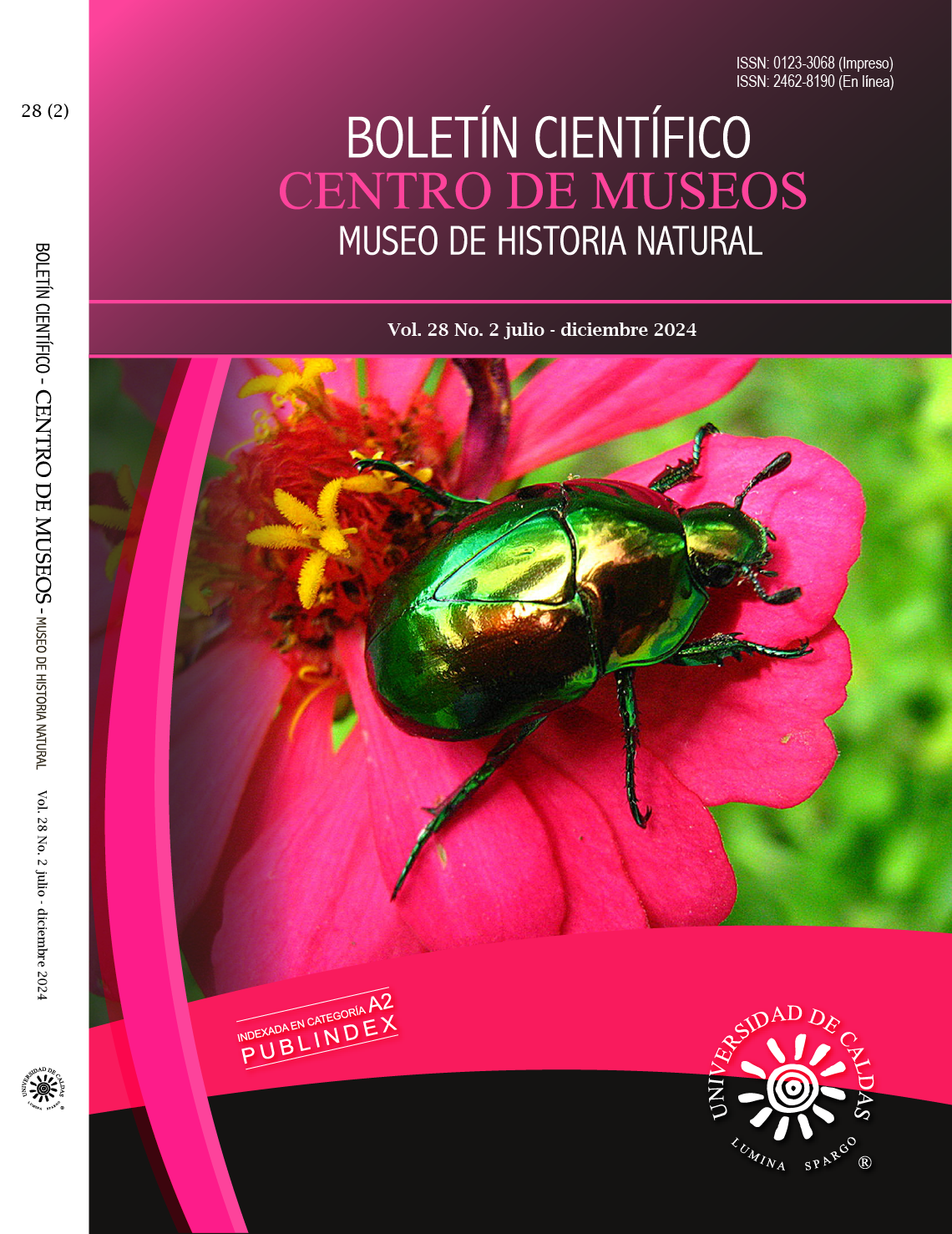Authors
Abstract
The spider wasps are Hymenoptera that provide spiders to their larvae as an only source of food. Approximately, 150 species are known in Colombia. Some regions, however, such as the Caribbean have been poorly sampled. In this work we review the Pompilidae specimens housed in the entomological collection of Universidad del Magdalena. We recorded nine species and subspecies, four of which expand their distribution to Colombian Caribbean, four represent new records for Colombia. and one represents the first geographical record to the country that corresponds to the neotype designation. Most of species that extend their distribution to Colombian Caribbean were only known from central and eastern region from this country, the species that represent new records were only known to countries such Costa Rica and others in the insular region of Caribbean. The knowledge in Colombia about spider-wasps is scarce because the family has been poorly studied. Therefore, the contributions to information regarding lists and distribution of species can be useful to know the family in the country.
References
Banks, N. (1945). The Psammocharidae (Spider-Wasps) of Northern South America. Boletín de Entomología Venezolana, 4, 81-126.
Banks, N. (1946). Studies of South American Psammocharidae Part I. Bulletin of the Museum of Comparative Zoology, 96, 311-525.
Banks, N. (1947). Studies of South American Psammocharidae Part II. Bulletin of the Museum of Comparative Zoology, 99, 371-486.
Bradley, C. (1944). A preliminary revision of the Pompilinae (Exclusive of the tribe Pompilini) of the America (Hymenoptera: Pompilidae). Transaction of the American Entomological Society, 70, 23-157.
Castro-Huertas, V., Pitts, J., Rodríguez, J., Waichert, C. y Fernández, F. (2014). New records of spider wasps (Hymenoptera, Pompilidae) from Colombia. ZooKeys, 443, 35-44. https://doi.org/10.3897/zookeys.443.8348
Cheng, J., Schloerke, B., Karambelkar, B. y Xie, Y. (2023). leaflet: Create Interactive Web Maps with the JavaScript ‘Leaflet’ Library. The
Comprehensive R Archive Network, Vienna, Austria. https://www.R-project.org
Cuervo, S. y Gamboa, Y. (2016). Especies del género Pepsis Fabricius 1804 (Hymenoptera: Pompilidae) de la colección entomológica del Museo de Historia Natural de la Universidad Pedagógica Nacional (tesis de pregrado). Universidad Pedagógica Nacional, Bogotá, Colombia.
Dunnington, D. (2023). Spatial Data Framework for ggplot2. The Comprehensive R Archive Network, Vienna, Austria. https://www.R-project.org
R Core Team. (2023). R: A Language and Environment for Statistical Computing. R Foundation for Statistical Computing, Vienna,
Austria. https://www.R-project.org
Evans, H. (1950). A taxonomic study of the Neartic spider wasps belonging to the tribe Pompilini (Hymenoptera: Pompilidae). Part 1. Transactions of the American Entomological Society, 75, 133-270.
Evans, H. (1966). A revision of the Mexican and Central American spider wasps of the subfamily Pompilinae (Hymenoptera: Pompilidae). Memoirs of the American Entomological Society, 20, 1-442.
Fernández, F. (1995). La biodiversidad de los Hymenoptera en Colombia. En J. Rangel (Ed.), La diversidad biológica en Colombia (pp. 373-442). Universidad Nacional de Colombia e INDERENA.
Fernández, F. (2000). Avispas cazadoras de arañas (Hymenoptera: Pompilidae) de la región neotropical. Biota Colombiana, 1, 3-24.
Fernández, F., Castro, V., Rodríguez, J., Waichert, C. y Pitts, J. (2017). Avispas cazadoras de arañas de Colombia (Hymenoptera: Pompilidae). Fauna de Colombia No. 6. Universidad Nacional de Colombia.
Fernández, F., Rodríguez, J., Waichert, C., Decker, B. y Pitts, J. (2022). Twenty two years later: An updated checklist of Neotropical spider wasps (Hymenoptera: Pompilidae). Zootaxa, 5116, 451-503. https://doi.org/10.11646/zootaxa.5116.4.1
Heraty, J., Ronquist, F., Carpenter, J., Hawks, D., Schulmeister, S., Dowling, A., Murray, D., Munro, J., Wheeler, W., Schiff, N. y Sharkey, M. (2011). Evolution of the hymenopteran megaradiation. Molecular Phylogenetics and Evolution, 60, 73-88. https://doi.org/10.1016/j.ympev.2011.04.003
Kemp, C. (2015). The endangered dead. Nature, 518, 292-294. https://doi:10.1038/518292a
Lucas, R. (1897). Fünf neue Notocyphus Arten. Entomologische Nachrichten, 23(9), 134-144.
Meineke, E., Davies, J., Daru, B. y Davis, C. (2018). Biological collections for understanding biodiversity in the Anthropocene. Philosophical Transaction of the Royal Society B, 374, 20170386. http://dx.doi.org/10.1098/rstb.2017.0386
Rafael, J., Melo, G., De Carvalo, C., Casari, S. y Constantino, R. (2024). Insetos do Brasil: Diversidade e Taxonomia. Instituto Nacional de Pesquisas da Amazônia (Manaus).
Sarmiento, C. (1993). Abejas y avispas (Hymenoptera: Apidae, Vespidae, Pompilidae y Sphecidae) del Santuario Nacional de Flora y Fauna de Iguaque, Boyacá, Colombia. Boletín del Museo de Entomología de la Universidad del Valle, 1, 1-11.
Shimizu, A. (1994). Phylogeny and classification of the family Pompilidae (Hymenoptera). Tokyo Metropolitan University Bulletin of Natural History, 2, 1-142.
Snelling, R. y Torres, J. (2004). The spider wasps of Puerto Rico and the British Virgin Islands (Hymenoptera: Pompilidae). Journal of the Kansas Entomological Society, 77, 356-376.
Suarez, A. V. y Tsutsui, N. D. (2004). The value of museum collections for research and society. Bioscience, 54, 66-74. http://doi.org/10.1641/0006-3568(2004)054[0066:TVOMCF]2.0.CO;2
Vardy, C. (2000). The New World tarantula-hawk wasps genus Pepsis Fabricius (Hymenoptera: Pompilidae). Part 1. Introduction and the P. rubra species group. Zoologische Verhandelingen, 332, 1-86.
Vardy, C. (2005). The New World tarantula-hawk wasps genus Pepsis Fabricius (Hymenoptera: Pompilidae). Part 3. The P. inclyta to P. auriguttata-groups. Zoologische Mededelingen, 79, 1-305.
Waichert, C., Rodríguez, J., Von Dohlen, C. y Pitts, J. (2012). The Spider Wasps (Hymenoptera: Pompilidae) of the Dominican Republic. Zootaxa, 3353, 1-47. https://doi.org/10.11646/zootaxa.3353.1
Waichert, C., Rodríguez, J., Wasbauer, M., Von Dohlen, C. y Pitts, J. (2015) Molecular phylogeny and systematics of spider wasps (Hymenoptera: Pompilidae): redefining subfamily boundaries and the origin of the family. Zoological Journal of the Linnean Society, 175, 271-287.
Waichert, C., Fernández, F., Castro-Huertas, V., Rodríguez, J. y Pitts, J. (2017). More new records of spider wasps from Colombia (Hymenoptera, Pompilidae). ZooKeys, 658, 89-95. http://doi.org/10.3897/zookeys.658.10538
Wasbauer, M. y Kimsey, L. (1985). California Spider Wasps of the Subfamily Pompilinae. University of California Press.

 PDF (Español)
PDF (Español)
 FLIP
FLIP
























